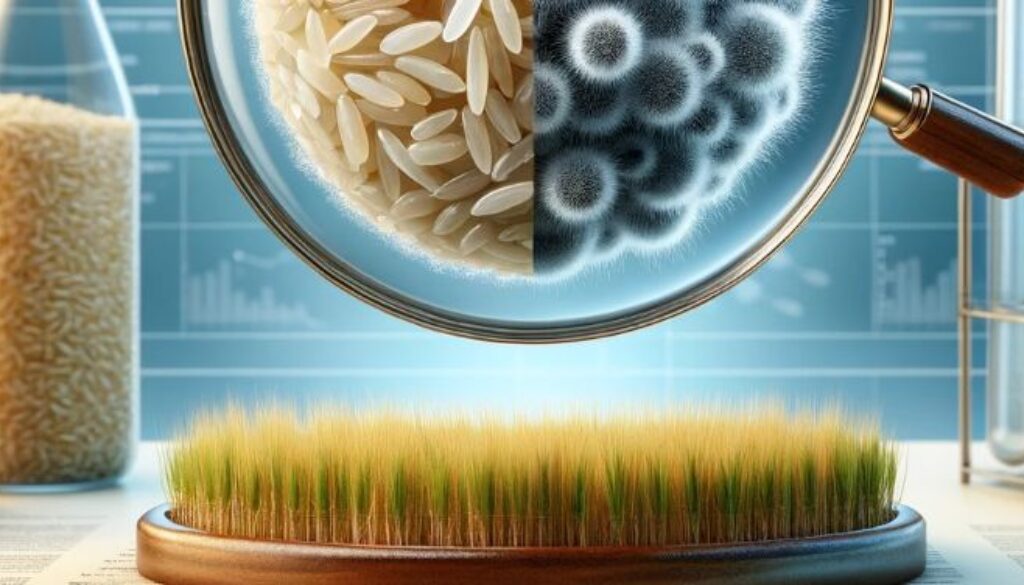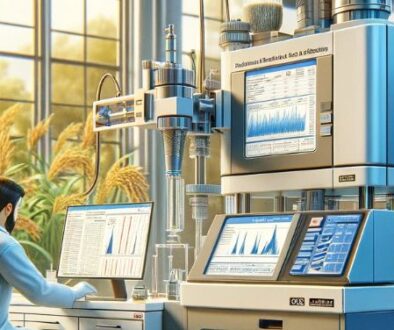Comprehensive analysis of mold contamination in rice from Beijing, highlighting significant infection rates, dominant molds, and implications for food safety practices.
This article analyzes the mold contamination of 52 items of rice from 3 grain depots and 34 grain stores in Beijing. The average grain mold infection rate is 39.4%. Among them, the rice produced in the south was significantly higher than the rice produced in the suburbs of Beijing, and 70.8% of the samples had an infection rate between 11 and 59%. The dominant bacterial phase was Aspergillus (66–92%). In southern rice, the detection rate of suspected toxin-producing bacteria such as Aspergillus flavus and Aspergillus versicolor is less than 2%. Toxin-producing strains of Aspergillus flavus accounted for 35.71%, and the content of naturally contaminated aflatoxin B1 in rice did not exceed the national standards.
Introduction to Mold Contamination in Rice
In recent years, food safety and quality have become paramount concerns globally, particularly with staple foods that form the foundation of diets. Rice, as one of the world’s leading food crops, is no exception. This study presents a comprehensive analysis of mold contamination across 52 rice samples collected from three grain depots and 34 grain stores within the Beijing region. The findings highlight significant concerns regarding the presence of mold in rice, with an average infection rate of 39.4%. Such data underscores the critical need for enhanced scrutiny and improvement in storage and handling practices to safeguard public health.
Comparative Analysis of Mold Contamination by Region
The research categorically compared rice produced locally in the suburbs of Beijing with those sourced from southern regions. A startling discovery was that rice originating from the south exhibited substantially higher mold contamination levels than those grown closer to Beijing. Specifically, 70.8% of the analyzed samples had an infection rate ranging between 11% and 59%. This discrepancy underscores the impact of regional storage and transportation practices on food safety, suggesting that the environmental conditions, along with the handling and storage methods in the south, may contribute to the elevated mold presence.
Dominance and Risks of Aspergillus in Rice Mold
The study meticulously identified the types of molds infecting the rice, revealing that Aspergillus species were the dominant bacterial phase, accounting for between 66% and 92% of the contamination. This genus of mold is particularly concerning due to its potential to produce mycotoxins, which can pose serious health risks when ingested. Among these, Aspergillus flavus and Aspergillus versicolor are known for their ability to produce aflatoxins, potent carcinogens that can contaminate food supplies. However, it is somewhat reassuring that the detection rate of these suspected toxin-producing species was less than 2% in the southern rice samples.
Prevalence of Toxin-Producing Aspergillus Strains
Further analysis within the study focused on the prevalence of toxin-producing strains of Aspergillus flavus, found to account for 35.71% of the contamination. Despite this high prevalence, the levels of naturally contaminated aflatoxin B1—a particularly harmful aflatoxin—were reported to be within national safety standards. This finding suggests that, while the presence of potentially harmful molds in rice is a significant concern, the immediate risk posed by aflatoxin B1 contamination may be controlled to a degree that does not exceed current health and safety regulations.
Implications for Food Safety and Quality Control
The implications of this research are multifaceted. Firstly, it underscores the critical need for rigorous and standardized practices in the handling, storage, and transportation of rice, particularly in regions with high humidity and temperatures that can foster mold growth. Secondly, it highlights the importance of continuous monitoring and stringent quality control measures to detect and mitigate mycotoxin contamination in food supplies. Lastly, the study calls for increased public awareness and education regarding food safety practices to minimize health risks associated with mold and mycotoxin contamination.
Conclusion and Call for Enhanced Safety Practices
In conclusion, while the findings from this analysis provide some reassurance regarding aflatoxin levels, they simultaneously raise significant concerns about mold contamination in rice. The data emphasizes the necessity for improved practices across the supply chain to ensure the safety and quality of this vital food staple.
For futher details of this article and research, feel free to contact our team for assistance.
Original research was done by Jia Zhenzhen, Du Xueqin, He Yumei, Du Juan
About ETprotein:
ETprotein, a reputable plant protein vegan protein Chinese factory manufacturer and supplier, is renowned for producing, stocking, exporting, and delivering the highest quality organic bulk vegan protein and plant proteins. They include Organic rice protein, clear rice protein, pea protein, clear pea protein, oat protein, watermelon seed protein, pumpkin seed protein, sunflower seed protein, mung bean protein, peanut protein, various of plant peptides etc. Their offerings, characterized by a neutral taste, non-GMO, allergen-free attributes, cater to a diverse range of industries. They serve nutraceutical, pharmaceutical, cosmeceutical, veterinary, as well as food and beverage finished product distributors, traders, and manufacturers across Europe, USA, Canada, Australia, Thailand, Japan, Korea, Brazil, and Chile, among others.
ETprotein specialization includes exporting and delivering tailor-made protein powder and finished nutritional supplements. Their extensive product range covers sectors like Food and Beverage, Sports Nutrition, Weight Management, Dietary Supplements, Health and Wellness Products, and Infant Formula, ensuring comprehensive solutions to meet all your protein needs.
As a trusted company by leading global food and beverage brands and Fortune 500 companies, ETprotein reinforces China’s reputation in the global arena. For more information or to get a free sample of their protein products, please contact them and email sales(at)ETprotein.com today.














